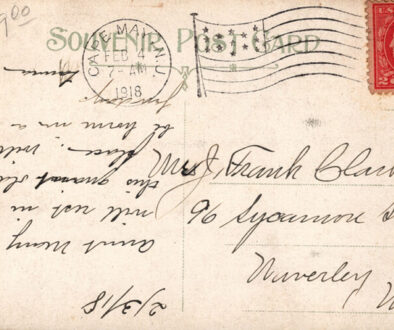I hear a symphony
This year, it’s party time—times three—for the Bay Atlantic Symphony. In 2023, the ensemble observes 40 years of music, 25 years with conductor Jed Gaylin, and 20 years as a partner of Cape May MAC.
“You’ve been told, by society’s subtle and not-so-subtle cues, that classical music is stuffy and boring and intellectual and Not for You. … Nothing could be further from the truth.”
Declassified, A Low-Key Guide to the High-Strung World of Classical Music, by Arianna Warsaw-Fan Rauch
In her 2022 memoir, violinist Rauch takes aim at a remarkably stubborn stereotype: that classical music is not only starchy and dull but irrelevant to the common man—kind oflike corset stays, or Latin, or the Ford Pinto. But as our own regional classical music station WRTI reminds us, “All music was once new.” In his time, Mozart was assuredly a rock star. Schubert was Springsteen. And Beethoven was Beyonce, at least in terms of influence and celebrity.
Jed Gaylin would likely agree. The conductor of the Bay-Atlantic Symphony isn’t especially fond of the term “classical music,” because it lumps together centuries-old and modern music, makes no distinction among the eras and artistic approaches, and unfortunately for some, reduces the genre to musical caviar—enjoyed only in rarefied circles, by people in monocles and opera gloves.

“For some reason, ‘classic rock’ doesn’t have a stodgy sound to it, but ‘classical music’ does—it’s not a terrible label, but it’s inadequate,” says Gaylin. “And the notion that somehow classical music is intended to be mothballed is so unfortunate, not for the music world but for society.”
He’s just as impatient with the idea that classical music is “good for you,” a mandatory dose of culture that is not necessarily stirring or enriching. “People say, ‘It’s so great to have an arts organization, because it improves the quality of life.’” Gaylin sighs. “Okay, I guess. But that doesn’t cover it. It improves life, but really, it is life.”
As he points out, people turn to classical music at life’s pivotal moments: in times of joy and tragedy, for births and deaths, at weddings. “This music is not only soothing or a balm but can be provocative and profound and take you on spiritual and aesthetic journeys.”
Take Beethoven’s Ninth Symphony, which the BAS will perform as part of its 2023 concert season. Gaylin calls it a “mirror of how human beings negotiate life. It doesn’t start with the ‘Ode to Joy.’ First there is a lot of questioning and a lot of attempts at answers, because great art doesn’t give pat answers, or a victory hymn in the first minute. As in all drama, there’s some churn, whether it’s Star Wars or Shakespeare or a contemporary American play.
“And curiously in art, the more personal the expression, the more it touches on an element in humanity that we all have, which magnifies it to the universal.”



Concertmaster Ruotao Mao, who came to the U.S. from Beijing, China, expands on the theme. For him, the Ninth Symphony embodies “the whole human experience. The first movement is galactic, showing how the world was created. The second movement reminds you: ‘First there is darkness, then there is light.’ The third movement is spiritual, and in the fourth movement, Beethoven goes back to the first three.
“With the ‘Ode to Joy,’ he expresses the highest possible human spirit, that all humans are brothers.”
Not so stuffy or boring, at that.
Piano Man
Gaylin is the son of a family therapist and a speech pathologist. He was born in Chicago and grew up in Washington, D.C. “There was music in our house,” he remembers, “a lot of singing—people would break out into spontaneous harmony.”
When he was a boy, his family took a bus to hear Charles Ives’ The Unanswered Question at the new Kennedy Center for the Performing Arts. Gaylin was electrified by “the spatial incredibleness of the music. The trumpet has this haunting refrain that keeps coming back. The woodwinds and flutes chatter and squabble in response.” At times, the piece is “confused and disharmonious.” Then it surges to an “almost religious hymn-like chorale. At age seven, I wouldn’t have had those words for it, but it was so powerful. I didn’t know music could do that.”
It’s not that he aspired, then and there, to be a conductor. But the concert “whet my appetite for immersing myself in that kind of music,” he says. He started piano lessons, and later studied piano and conducting at Oberlin Conservatory and the Peabody Conservatory.” As for role models, he calls Leonard Bernstein “kind of a prophet for me.”



Gaylin would go on to perform and conduct around the world, but his salad days included restaurant gigs, in which he fielded requests for “New York, New York,” “Memory” from Cats, and, inevitably, “Piano Man.” Today, he leads not only the BAS but the Hopkins Symphony Orchestra, in his home city of Baltimore, and the Two Rivers Chamber Orchestra in Shepherdstown, West Virginia. His mission: to bring the music he loves, in all its infinite variety, to as many listeners as possible.
Cape May County residents, who live well over an hour in any direction from a major metropolis, are lucky to have this movable musical feast, which plays in casinos as well as concert halls, has accompanied pop singers like Melissa Manchester, and even backed Jason Alexander in concert (yes, Seinfeld’s George Costanza is a song-and-dance man).
“I’m happy to do pops concerts,” says Gaylin, “because it’s fun and everyone has a good time. But it doesn’t have as many layers for me as a chamber work by Schubert.”
Of course, the symphony has also hosted superstars in the genre, like violinist Stefan Jackiw, pianists Yuja Wang and Shai Wosner, flutist Eugenia Zuckerman, and guitar phenomenon Junhong Kuang. And who can forget a long-ago guest appearance by Grammy-winner Hilary Hahn? The violin virtuoso, who is at home on world stages from Carnegie Hall to La Scala, joined the BAS in 2006 in the old Cape May Convention Hall, where she played under a dusty disco ball.
Culture Club
With home bases at Rowan University in Vineland and Stockton University in Galloway, the BAS performs subscription-based and free concerts across its performance area, which stretches from the Delaware Bay to the Atlantic Ocean. In association with Cape May MAC, it also plays the Cape May Music Festival, with small group “Bach’s Lunches” and larger, full-scale orchestral performances at Convention Hall. Its season of about two dozen concerts reaches thousands of people yearly.
“Some of our patrons are conversant in classical music,” says BAS executive director Brian McPeak, “but for others, this might be the first orchestra they’ve seen in live performance. And experiencing a great concert live in a wonderful hall—well, there’s nothing like it.”
Best of all for listeners, he adds, there’s no whiff of elitism about the symphony or its soft-spoken conductor. “People don’t need to go through music appreciation courses in order to come and enjoy.”
Along with the whole “stodgy” stereotype, there’s another myth associated with classical music: that conductors are imperious divos or divas who wield the baton like a whip. In the recent motion picture Tár, Cate Blanchett plays to the myth as a “brilliant but manipulative conductor” who, according to one review, “orchestrates everyone around her” and scares the bejesus out of her musicians.



“That stereotype doesn’t fit our modern world,” says Gaylin, “and it certainly doesn’t fit me. When musicians are free to play with a commitment that is not fear-based but based on their artistry, that’s when the art thrives in their souls and therefore, on our stage and in the hearts of the audience.”
Mao describes the conductor as “very devoted, very enthusiastic, very creative, but above all, we feel he is a friend of the orchestra. The friendship feeling Jed delivers doesn’t always come naturally between orchestra and conductor—some conductors think they have to be the boss, be assertive, which can make the musicians feel a little bit on edge.”
Cellist Brenda Leonard of North Cape May agrees. “I’ve played for people who are self-focused or music-focused to the point that [the musicians] are like automatons. Not Jed. There’s a level of kindness in his approach. When the pandemic hit and we couldn’t perform, he reached out to every member to talk and chat. I got to know him better then. Now I would count him as a friend.”
Classical music is having something of a moment right about now, with multiple Oscar nods for Tár, and an upcoming Netflix biopic Maestro, about the life of Bernstein. And who plays the most famous conductor (arguably) of the 20th century? Philly and South Jersey habitue Bradley Cooper. (Check out pics of Cooper as Lenny—the resemblance is startling, and the famous white pompadour really sells the look.)
In an interview, Cooper said he’s been asked, “‘What is it that conductors even do? Aren’t you up there sort of [waving your arms around]?’ And my answer is, ‘It’s the absolute hardest thing you could ever want to do. It is impossible.’”
Teach Your Children
Bernstein did his part to democratize classical music. His Young People’s Concerts, televised on CBS in the 1960s, introduced a generation of American kids to the music of the masters. Gaylin does likewise, bringing classical music to local schoolchildren, despite their occasional skepticism.
He remembers taking a string program into a high school. It was 2pm on a Friday afternoon, late in the school year. Clearly, the kids wanted nothing more than to be saved by the bell. “They were like, ‘Oh my God, what are we doing here?’” Gaylin says.
So, he tossed his script and asked them to list their favorite songs and bands. He compared those hits (which are “chained to a drumbeat”) to the sinuousness of the strings. Then he conducted an experiment.

“I said, ‘We’ll play this straight, as though we had a drum behind us. And then we’ll open it up, to see how many more chances we get to take in this music.’ And all of a sudden, they were on the edge of their seats.” The great works, he says, “take us to places that are far more adventuresome than anything you’d hear on Top 40.”
If there’s one thing classical music can claim, it’s staying power. Who knows if today’s pop and hip-hop artists will be played or even remembered 10 years from now? But classical music dates back to the Renaissance, for a greatest-hits list that is more than 600 years old.
But it is not just “music by long-dead Europeans,” says Father Alan Leonard, husband of cellist Brenda and pastor at the Church of the Advent, a frequent performance space for the BAS.
“You may not hear this music on your local pop radio station, but it’s wonderful. It has the ability to move the soul and connect us to God.” The church concert series is well-attended and brings some people back for Sunday worship. In that way, Leonard adds, “it’s good evangelism.”
Take a Bow
MAC executive director and CEO Jody Alessandrine, who succeeded Michael Zuckerman in the role in 2020, recalls his first time working with Gaylin and the BAS. Together, they and the corps of musicians cobbled together a performance schedule during the worst of the Covid-19 pandemic.
“It forced us to present classical performances, taped with musicians playing their parts in different places and at different times, then compiled and presented online.” Fortunately, in 2022, Gaylin “was able to put together a full orchestra for us for the first time in years.

“Jed is a professional’s professional,” says Alessandrine, “and we wish him the sincerest of congratulations on his 25th year with the Bay Atlantic Symphony. Bravo as well to the BAS on its 40th year in operation and the 20th anniversary of our thriving partnership.”
The symphony’s longevity, through good times and bad and ever-changing musical tastes, “is a testament in itself” to its value, says Mao. “It’s a wonderful organization.”
Gaylin likes to tell the story of a BAS concert in which a former board member sat beside a young Stockton student. In the middle of the performance, the student began to cry.
“Our board member said, ‘Is everything okay?’ And the student said, ‘I never expected it could be so beautiful.’ That’s what made me fall in love with music and want to share it in its fullest sense with other musicians and with our audience.”
Cue the applause.



